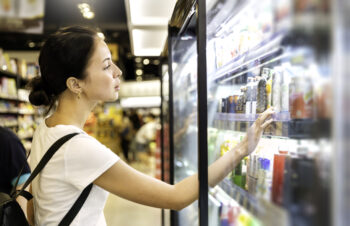 Childhood is a dynamic time of discovery and exploration. It’s important however, for parents and caregivers to ensure that children are exploring in healthy and safe ways.
Childhood is a dynamic time of discovery and exploration. It’s important however, for parents and caregivers to ensure that children are exploring in healthy and safe ways.
When it comes to establishing positive nutrition habits for youth and teens in particular, parents often have many questions about caffeine intake, and more specifically about energy drinks.
On the Pulse spoke with Dr. Suzan Mazor, an emergency attending physician and the medical director of toxicology at Seattle Children’s, to help separate fact from fiction.
Are energy drinks safe for kids?
An energy drink is a beverage that contains high concentrations of caffeine and other stimulants like guarana, taurine or L-carnitine. The American Academy of Pediatrics (AAP) advises against caffeine for children under 12. It recommends that children between the ages of 12 and 18 should not consume more than 100 mg of caffeine in one day, which is equivalent to the amount of caffeine found in one standard cup of coffee.
“Caffeine plays an unhealthy role in the diets of too many children and adolescents,” explained Dr. Mazor. “Energy drinks are sold as nutritional supplements, so they are not regulated as foods. As a result, their labels often don’t reveal the exact amount of caffeine in each drink.”
Many energy drinks also have large quantities of added sugar, often between 25 to 30 teaspoons per can, according to the Centers for Disease Control and Prevention (CDC).
“Unfortunately, there’s a problem with certain energy drinks that exceed the Food and Drug Administration’s (FDA) mandated limit of 71 mg of caffeine for a 12-ounce soda,” added Dr. Mazor.
It is estimated that every day approximately 3 in 4 children consume caffeine from various drink and food sources. The AAP continues to discourage the consumption of caffeine and other stimulants by children and adolescents.
Though the FDA does indicate that healthy adults can typically drink around 400 mg of caffeine per day, equivalent to about 4 or 5 cups of coffee, the agency does not cite a recommended amount of caffeine intake for children and adolescents. It does however warn that both kids and adults should avoid pure and highly-concentrated caffeine products such as powders or other liquids, which can sometimes have caffeine content equal to 20 to 28 cups of coffee per serving.
“This questionable chemistry may put some children’s health at serious risk,” said Dr. Mazor.
Health impacts of energy drinks
Consuming energy drinks may trigger symptoms that can include restlessness, shaking hands, stomachaches, headaches and nervousness.
“Energy drinks can also cause irregular heart rhythms and other life-threatening heart-rhythm changes,” added Dr. Mazor. “People who have heart disease or high blood pressure are at additional risk. The bottom line is that children and adolescents should never consume energy drinks.”
What about sports drinks?
Sports drinks contain carbohydrates (sugar), sodium and potassium. When it comes to physical activity and what children should drink during or after routine exercise, plain water is recommended.
“Sports drinks often contain extra calories and sugar that may contribute to obesity and tooth decay,” explained Dr. Mazor. “They have a limited function for pediatric athletes and should be ingested in combination with water when there is a need for rapid replenishment of carbohydrates and/or electrolytes during prolonged, vigorous physical activity.”
Families should practice healthy nutrition habits with their kids and teens by limiting sugary beverages like soda and juice and making water and low-fat milk their regular drinks.
“It’s important for parents to know that the negative health impact of energy drinks is a concern for families all across the United States,” said Dr. Mazor. “Ongoing conversations between parents and pediatricians about energy drinks are essential in order to maintain our children’s overall health and well-being.”
Resources:
- Energy Drinks | Healthy Schools | CDC
- Spilling the Beans: How Much Caffeine is Too Much? | FDA
- Performance-Enhancing Supplements: Information for Parents – HealthyChildren.org
- Choose Water for Healthy Hydration – HealthyChildren.org
- Keeping Kids Hydrated – Seattle Children’s (seattlechildrens.org)
- Healthy Eating Habits – Seattle Children’s (seattlechildrens.org)

